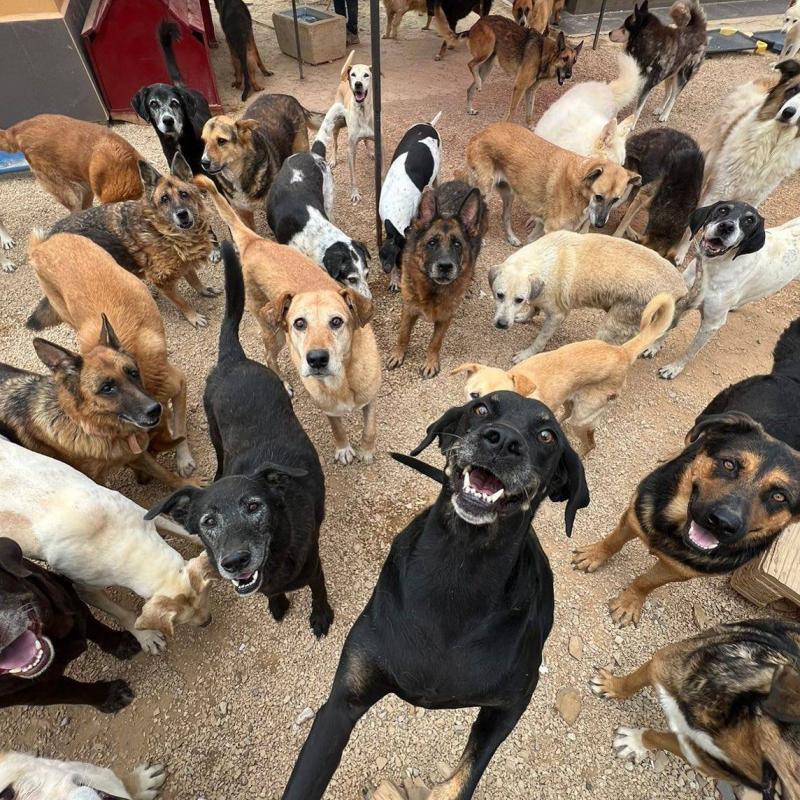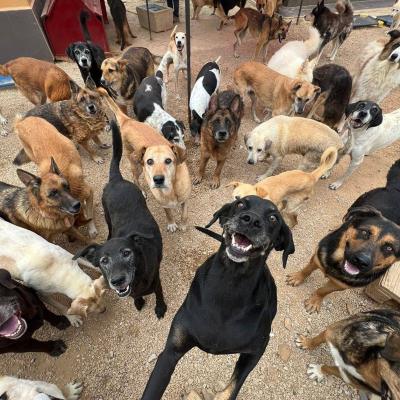The pain of dogs as they suffer from the poison "Lanite" parallel the anguish of the Lebanese regarding the state of a country afflicted by deteriorating values, morals, and crumbling foundations. The situation has worsened to the point of mass slaughter, necessitating a return to the year 1943, the date of Lebanon's independence. At that time, Lebanon was considered the most animal-friendly country in the Middle East, with its government building shelters for animals in collaboration with NGOs. In that era, around 14 cases of animal cruelty were documented, prosecuted, and fined in a single month. What has changed in 80 years?
The collective massacres against dogs, cats, and humans, especially in the last three years due to escalating social and economic conditions, reveal an ethical crisis that allows the use of "Lanite pesticide" out of disdain for stray animals. Instead of addressing the problem through scientific global methods for reducing the reproduction of dogs and cats in the streets—such as neutering and sterilization—the painful method of amputation has emerged. This causes the animal to endure pain equivalent to four to five hours of convulsions from the toxins, resulting in a white foam emerging from their mouths, indicating the toxicity of the food they consumed, mixed "maliciously in collusion with several municipalities," according to activists' testimonies, with the substance "Mithomyl," the main component of the famous "Lanite" pesticide. This pesticide, intended for exterminating rats and treating fruit trees from pests, is sometimes diluted according to the Ministry of Agriculture's guidelines.
How has Lebanon dealt with this? In 2017, after a series of massacres made public by social media, the Lebanese Parliament approved the Animal Protection and Welfare Law. Article 7 states, "An animal may be killed under the supervision of a veterinarian and by one of the means of euthanasia. Killing is mandatory in cases specified by this law. The means of euthanasia shall be determined by a ministerial decision and periodically amended according to the latest available scientific techniques."
In 2022, the Ministry of Agriculture issued a statement indicating: "After repeated attempts to poison dogs in several municipalities, the ministry emphasizes the prohibition of using Lanite poison in any attempts to eliminate animals, insisting on addressing any poisoning attempts through the appropriate legal frameworks by resorting to the competent judiciary and urging security forces to act swiftly to conduct necessary investigations to identify and hold accountable the perpetrators." The ministry confirmed that "municipalities must act to stop these crimes against humanity."
However, what has transpired on the ground, coupled with the overflow of waste dumps, has disregarded both the laws and official calls, leading the situation to resemble "each alley for its own," with approximately 50,000 stray dogs compared to around 20,000 five years ago. The only means of mitigating the risks of a "dog bite" or rabies is collective extermination, blessed by municipalities, to avoid further expenditures required for neutering, sterilization, and vaccination.
The Complicity of Municipalities?
Animal rights activist Ghina Nahfawi asserts that several municipalities are complicit in the repeated mass killings, based on her personal experience: "I requested Lanite from a store selling agricultural fertilizers under the pretext of getting rid of rats, but the seller refused, stating: 'This material is only sold to municipalities and not individuals.'" Nahfawi, who has faced legal pursuit multiple times for disclosing the names of those involved in killing animals, remarks: "The seller's acknowledgment is enough to know what's happening behind the scenes." She points out that there are exceptions, but they are few, such as the initiatives taken by the municipalities of Tripoli and Al-Mina in establishing shelters for stray animals.
Nahfawi warns about Lanite, stating: "This substance not only kills animals but also humans through its seepage into soil and plants. In light of the dangers associated with its use, the Ministry of the Interior must be strict in pursuing those who spread this poison, noting that most stray dogs originally belong to people who abandoned them due to the economic crisis and the promoted notion that animals contribute to the spread of COVID-19."
**Karma Association**
After waves of violence targeting dogs—from shooting them to poisoning them and filming their final breaths—and due to the constant threat of killing in many areas, especially in Tripoli, Zainab Rzouq Maktabi founded the "Karma" association eight years ago from Tripoli, intending to expand its reach. Together with several volunteers, she provides shelter, food, and necessary medical care. Zainab recalls that the idea for the association arose after 22 dogs were poisoned in Al-Mina, Tripoli. When she filed a lawsuit against the perpetrator, the investigator asked her, "What's the point of those street dogs?" Hence the decision to establish the association aimed at officially defending the rights of these suffering souls.
Five years ago, Zainab succeeded in creating an animal shelter in Tripoli on land belonging to the Al-Mina municipality. She summarizes her experience: "Last year was the toughest for the association due to the large number of pets abandoned on the streets," denouncing this inhumane act: "Most of these animals do not know how to defend themselves on the streets, so many ended up injured with fractures from abuse, accidents, or attacks from wild animals." Karma has organized awareness campaigns for school students to encourage them to care for and help dogs. Through social media, they strive to find homes for stray dogs by posting on their pages for those willing to house or care for them. Zainab remarks, "All these efforts require substantial financial coverage, and we have no support from organizations or associations, relying instead on individual initiatives, with a significant decline in the number of people willing to adopt."
Zainab also expresses her gratitude to several veterinarians who have worked with the association to alleviate the burden of bills; nevertheless, the association struggles under the weight of inflated bills due to some cases requiring multiple surgeries for serious fractures.
**Culture of Compassion**
Hussein Hamze, an animal welfare activist and supervisor at a dog shelter in the Kfour area, summarizes the crimes against animals, saying: "We lack a culture of compassion," criticizing the growing phenomenon of disposing of animals either through execution, Lanite, or abandonment. He states: "Unfortunately, a Lebanese person has the money to secure hookah tobacco and gasoline for leisure, but not to care for a pet."
Hamze grew up in Germany and chose to take on the responsibility of protecting dogs through a sanctuary, providing shelter, feeding, taming, and caring for them. He compares: "In Europe, a child takes on the responsibility of caring for their pet from a young age, whether for morning walks or providing food and supplies from their allowance, preparing generations to assume responsibility and commitment from an early age." In Lebanon, instead, "It is the adult, not the small child, who abandons their pet to evade even the minimum requirements of moral and material obligation, which is the biggest dilemma in raising generations on abandonment and irresponsibility."
**Identity and Penalty**
Can animals be licensed? The dream remains suspended amidst the chaos permeating various aspects of life, while animal-friendly countries depend on identity cards that quickly reveal owners in the event they abandon their pets. As for stray dogs, there is no option but neutering and vaccination to limit their reproduction... All these measures await a transition from chaos to the light of laws that prioritize souls over material gain. When will this happen?




